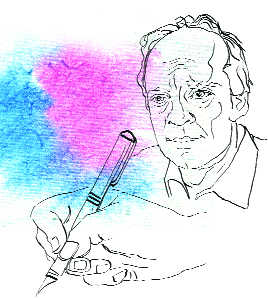Novelist and poet Vikram Seth will be at Panjab University on January 8 to deliver the second Professor Urmi Kessar Memorial Oration on “Thoughts on being a writer”. I had first read the “Golden Gate”, Seth’s first novel, written in verse, in 1988, my curiosity fuelled by the hype over the sonnets being written in iambic tetrameter, inspired by Pushkin’s work. What Seth says about being a writer will indeed be priceless and of great value to those who aspire to be one.
As Francis Bacon said, “Reading maketh a full man, conference a ready man, and writing an exact man.” It is an exercise that allows one to reflect, introspect and be by oneself, and in doing so, delve deep into aspects not visible otherwise. Just as the heart is said to be utmost at rest while walking, so is the mind while at writing, by turning unidirectional, casting aside all trivia.
Different writers have had their own views on writing. I once interviewed Anurag Mathur, author of the bestseller The Inscrutable Americans at his home in Delhi. He said writing was like muscles, it needed exercise, a point underscored by the poet Alexander Pope who wrote, “True ease in writing comes by art, not by chance; as those move easiest who have learnt to dance.” It is through the rigour of being constant and consistent that writing matures.
Vishnu Prabhakar, author of Awara Masiha, a biographical work on Sharat Chandra Chattopadhyay, said for writing, one needs anubhav (experience) and anubhuti (sensitivity). Unless you have these, you cannot draw from the well of emotions and portray the characters of your work with subtlety and finesse. Banbhatta, the author of Harshacharita, a biographical work of his patron Harshavardhan, the king of Kannauj in ancient India, would travel incognito, and mix with people from all walks of life to be able to create the characters for his works.
Discipline is also part of a writer’s regimen. You fix your routine and be at your desk every morning. A great writer like Khushwant Singh was said to be a stickler for this. He was said not to entertain late evening guests for he had his morning regimen to adhere to. There is the writer’s block that one has to deal with at times, but it is like a temporary loss of form, regained gradually.
Remuneration is also a part of perils a writer has to encounter. Not all writers win Booker Prize and not all of them are paid well. In fact, some of the greatest litterateurs have been worse off economically. I once ready a book on letters written by the great Russian writer Leo Tolstoy. Tolstoy was rich unlike Fyodor Dostoevsky, his contemporary. In a letter to Tolstoy, Dostoevsky complained that he was not paid well because “I have to live off my work.” There lies the danger of becoming a full-time writer, depending on earnings from it for sustenance. While it may not hamper creativity, it undermines the bargaining power vis a vis the publishers. In his autobiographical work, Joseph Anton -- A Memoir, Salman Rushdie describes how in his early days he worked as a copywriter for an ad agency in London. He says that all those who had some disregard for their work and threatened to leave were the ones who were valued above the others. It upheld the validity of Dostoevsky’s observation.
Also, being a writer does not always mean being a scholar, a litterateur or in public domain. In fact, the early forms of writing, that helped preserve and develop languages, has disappeared. Writing a diary and letters have all done a vanishing act with the advent of information technology.
Writing a diary helped Mahatma Gandhi cut costs by identifying wasteful expenditure while studying to be a barrister and Jawaharlal’s Nehru’s letters to his daughter Indira Priyadarshini were once a part of school syllabus. Leave aside the serious stuff, nobody writes even a billet doux (love letter) anymore, gadgets and modern lingo having taken over.
Lastly, there is the commitment. Keep doing it if you like it. As a former senior colleague once remarked, “If I don’t write, I don’t exist.”
Unlock Exclusive Insights with The Tribune Premium
Take your experience further with Premium access.
Thought-provoking Opinions, Expert Analysis, In-depth Insights and other Member Only Benefits
Already a Member? Sign In Now










